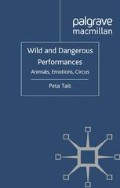Abstract
When Mabel Stark claims to have an inherited ability called ‘animal sense’, she evokes the animal physicality of humans (1940: 25). But this ‘animal sense’ is actually describing a way of knowing about others. Stark’s statement that she ‘can sense the mood of each of my cats as he enters the work arena’ attributes to animals emotional moods that can be known (1940: 21). While admittedly this also aligns with a widespread belief that animals encounter the world through their senses, it values the understanding achieved in this way. In grouping herself with her big cat performers, Stark highlights how sensory experience is often omitted from human descriptions of engagement in the world.
Access this chapter
Tax calculation will be finalised at checkout
Purchases are for personal use only
Preview
Unable to display preview. Download preview PDF.
Copyright information
© 2011 Peta Tait
About this chapter
Cite this chapter
Tait, P. (2011). Sensing Emotion. In: Wild and Dangerous Performances. Palgrave Macmillan, London. https://doi.org/10.1057/9780230354012_7
Download citation
DOI: https://doi.org/10.1057/9780230354012_7
Publisher Name: Palgrave Macmillan, London
Print ISBN: 978-1-349-31961-9
Online ISBN: 978-0-230-35401-2
eBook Packages: Palgrave Theatre & Performance CollectionLiterature, Cultural and Media Studies (R0)

